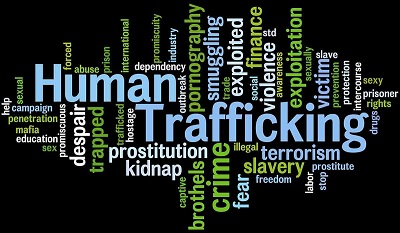By: Lesira Rampa
A despicable estimated amount of $150 billion is generated annually from the odious human trafficking. According to several notable sources, there are more slaves in the world today than ever before at any point in history. Sadly, with the rise of economic factors like poverty, unemployment and inequality the dark crime perpetuates more than ever before. This industry is administered through a network of traffickers that exploit the vulnerable in society for purposes ranging from sex trafficking, organ harvesting to forced labour. It is important to acknowledge that criminals, including those of human trafficking have shown a shocking rise in cunning strategies and so it becomes even more crucial for policies and other protective measures by law enforcement to evolve accordingly.
Various factors contribute to one’s vulnerability, but great poverty poses a significant threat to human security. Immediately one feels the sharp claws of poverty — the willingness to take risks sets in. All logic is lost and one takes any opportunity that presents itself to put food on the table. To remedy this, it is imperative to keep increasing the rate of skills training in various fields such as arts and crafts, food and cosmetics manufacturing to help create employment opportunities just as some Basotho are doing recently, the fast spread of these type of workshops will eventually help Basotho to resist the temptations of traffickers. Additionally, awareness campaigns must be a constant norm, sensitizing communities on human traffickers’ tactics and be equipped with the knowledge to detect dangerous situations and avoid exploitation.
No stone must be left unturned in combating human trafficking, it is a vile crime against humanity. It is therefore very important to strengthen without leniency all measures of security; to closely examine the hidden beneficiaries of this human trade, not leaving out border officials whose job amongst other responsibilities involve the prevention of illegal human movement. It is with firm belief that border officials do their jobs diligently, but some may fall for fast cash in exchange for aiding with the facilitation of this trade — leaving out even a trace of empathy. This calls for measures such as prioritizing accountability within officials, capitalizing on reporting and addressing any dent of human trafficking related corruption within the system.
On being thorough to the last detail, must I note that as much as a high percentage of victims of human trafficking environs women and children, there are still as many cases surrounding men. Sources varying from UNICEF and the International Labour Organization (ILO) indicate that children may be coerced to serve in arm conflicts worldwide. This includes young boys and men. Boys are forced to commit war crimes, used as child soldiers and as spies amongst other roles. And so just as it is the case with cases of sexual abuse, the reason why human trafficking related incidents are under-reported in most countries just not in Lesotho is the stigmatization, shame and the fear of retaliation from the human trade perpetrators. Lesotho anti-trafficking campaigns must remedy this by not only focusing on women and children as targets of human trafficking but also recognise the prevalence of male trafficking as well. The economic consequences left by the trauma victims have experienced include difficulty finding employment — the government of Lesotho in collaboration with NGOs could then engage experts to help facilitate specialised therapy for victims of human trafficking.
Furthermore, employing the Forth Industrial Revolution(4IR) innovations can potentially revolutionise the efforts taken to wage war against human trafficking. Surveillance and monitoring tools may be deployed at Lesotho borders to help rescue victims, while phone applications can be created for the benefit of reporting trafficking related crime anonymously, coupled with block chain technology because in instances where traffickers do not bother to source their victims in person, they recruit them through social media, using platforms like Facebook and Telegram to circulate false employment opportunities.
Ultimately, the dark economics of human trafficking very much thrives in the context of a country that is plagued by low economic development and soaring poverty rates that erode the sense of patriotism among its people. Driven by desperation, Basotho have in recent times become so willing to risk everything to seek employment opportunities from abroad. Therefore, in addressing underlying economic factors there is a possibility that inspiring significant measures to combat human trafficking go hand in hand with rekindling Basotho’s love for their nation, knowing their needs are catered for in terms of their livelihood. Knowing that seeking opportunities abroad would not be led by coercion and life’s conundrums but only a matter of choice and choices through proper or decent channels.


